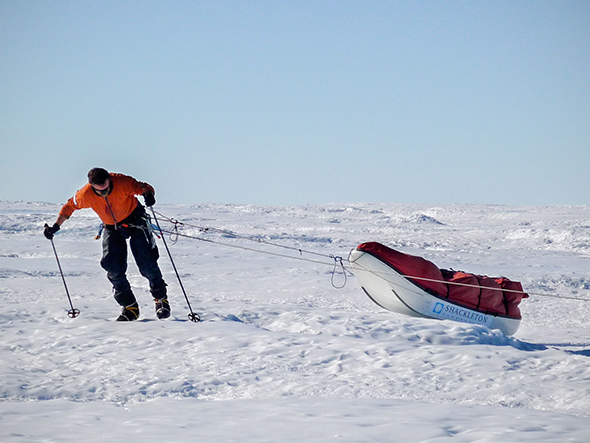The British ex-army officer was evacuated 30 miles short of his goal.
Henry Worsley, a 55-year-old British ex-army officer and veteran polar explorer, has died in his attempt to become the first person in history to cross the Antarctic continent solo, unsupported, and unaided. Worsley was attempting to complete the route proposed by Ernest Shackleton during the ill-fated Endurance expedition, which celebrates its centennial this year. He had been on the ice alone for 71 days, covering 913 miles, and was suffering from exhaustion, dehydration, and severe stomach pains when he called for a rescue only 30 miles from his destination on the edge of the Ross Ice Shelf.
Just before departing on the journey in November, Worsley spoke to National Geographic about the challenges he would face. “I know I’m going to suffer for the first few weeks, and I know I’m going to have bad days,” he said. “But I’m generally a cup-half-full man, so I’ll grit my teeth and get on with it.”
On Friday, in his last dispatch from Antarctica, Worsley declared: “…a gradual grinding down of my physical endurance finally took its toll today, and it is with sadness that I report it is journey’s end—so close to my goal.” Shortly after he called to be evacuated, he was airlifted by staff at Antarctic Logistics and Expeditions to their base on the Union Glacier and then on to Clinica Magallanes in Punta Arenas, Chile, where he died from organ failure on Sunday. It is reported that Worsley had been suffering from peritonitis, an infection of the tissue lining the abdomen.
Worsley’s expedition had raised more than $142,000 for a charity called the Endeavor Fund, which supports the recovery of wounded, injured, and sick British servicemen and women. Prince William, a patron of the Endeavor Fund, wrote in a recently released statement: “We have lost a friend, but he will remain a source of inspiration to us all.”
Doug Stoup, a prolific American polar explorer who has been on 38 expeditions to Antarctica, including 15 trips to the South Pole, had been closely following Worsley’s journey when he heard the tragic news. “He was one of the last great explorers of our generation and a truly humble human being,” Stoup said by telephone from Charlottesville, Virginia. “You might think it’s more dangerous to undertake a journey like this alone, but for a guy like Henry it’s actually safer to go solo. He was a professional and was so experienced that he would have ended up guiding anyone he would taken along. ”
“Rarely do we set the high bar one notch above what we think we can clear, and that’s what’s driving me on here.” —Henry Worsley
When asked why he wanted to undertake such a dangerous trip alone, Worsley replied, “On my previous trips I was always part of a team, and so this time I wanted to have the clarity of making all my own decisions. I’ve always sort of lived by the phrase, “Try something you could fail at. We all do things that we can comfortably achieve, but rarely do we set the high bar one notch above what we think we can clear, and that’s what’s driving me on here.”
Fuente: adventureblog.nationalgeographic.com
